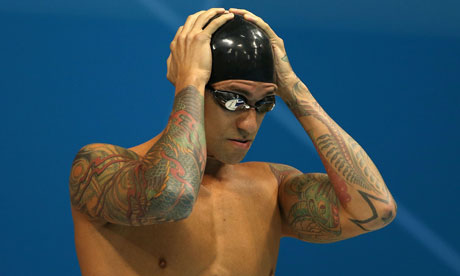It’s time for another Buddha Buzz! We’re keeping it light today, though, so you may want to read our current meditation doctor’s tips on lightening up before you continue so that we’re all on the same page.
Feeling sufficiently lightened? Okay, let’s go.

Last week on Buddha Buzz we discussed the possibility that Bill Clinton may be Buddhist. This week we’ve got another famous convert: Olympic swimmer Anthony Ervin. The dude’s got a crazy life story. After winning a gold medal in the Sydney Olympics, he sold it on eBay for over $17,000, donating the money to Unicef. Then he became a drug addict and an alcoholic, tried to kill himself, and finally turned it all around by becoming a “committed Buddhist.” Now he’s back at the London Olympics, swimming in the 50m freestyle finals tonight. Good luck to him!
You may or may not have read “Buying Wisdom,” an article by Richard Eskow from our latest Tricycle issue. If you haven’t, it critiques the recent Wisdom 2.0 conference in Silicon Valley, which gathered together all the head honchos of the techie world to discuss things like the marketing together of spirituality and the ability to become a millionaire. Eskow left the event unimpressed. Still, the larger issue at hand—the emerging relationship between technology and wisdom—is an interesting one. Over at the Daily Beast, they think so too, judging by an article that appeared this week called “Dalai Lama, Twitter Rock Star: The Virtual Influence of His Holiness,” by Melinda Liu. With almost 5 million Twitter followers, the Dalai Lama has a social media team just like any other celebrity (the article compares him, Twitter-wise, to Deepak Chopra, Obama, and Lady Gaga). Spoiler alert: The Dalai Lama doesn’t write his own Tweets. Yeah, I’m sure that surprised absolutely nobody. Actually, there are two people working as the Dalai Lama’s full-time Tweeters. Judging by the article, they all seem to have their heads in the right places, and despite the Dalai Lama’s strong Internet presence, in reality he still does things the old-school way:
About 15 years ago, to capitalize on the release of two Hollywood films, Seven Years in Tibet starring Brad Pitt and Kundun directed by Martin Scorsese, consultant [Josh] Baran pulled together a 50-page PowerPoint-style presentation titled “Tibet 2000” proposing that the government-in-exile use conferences and celebrity endorsements to raise public awareness about Tibet.
“His people liked it and said, ‘Go present it to the Dalai Lama.’ I thought that meant sit down and walk him through the campaign,” Baran chuckled. “Instead I was hustled into the presence of the Dalai Lama, who flipped through pages for maybe 30 seconds. Then his people asked him to give his blessing. He laid his hand casually on the top page and literally blessed the PowerPoint.”
That campaign got the Dalai Lama’s message across so potently that, within a couple years, The New York Times was trumpeting “the powerful Tibet lobby.”
In an example of Buddhism and modernity not jibing quite as well, a Japanese video game company has released a game called Sutra Master that is generating considerable controversy in Japan. Instead of describing it, I’ll just show it to you:
What do you think? All I can think about it is…weird.
Thank you for subscribing to Tricycle! As a nonprofit, we depend on readers like you to keep Buddhist teachings and practices widely available.